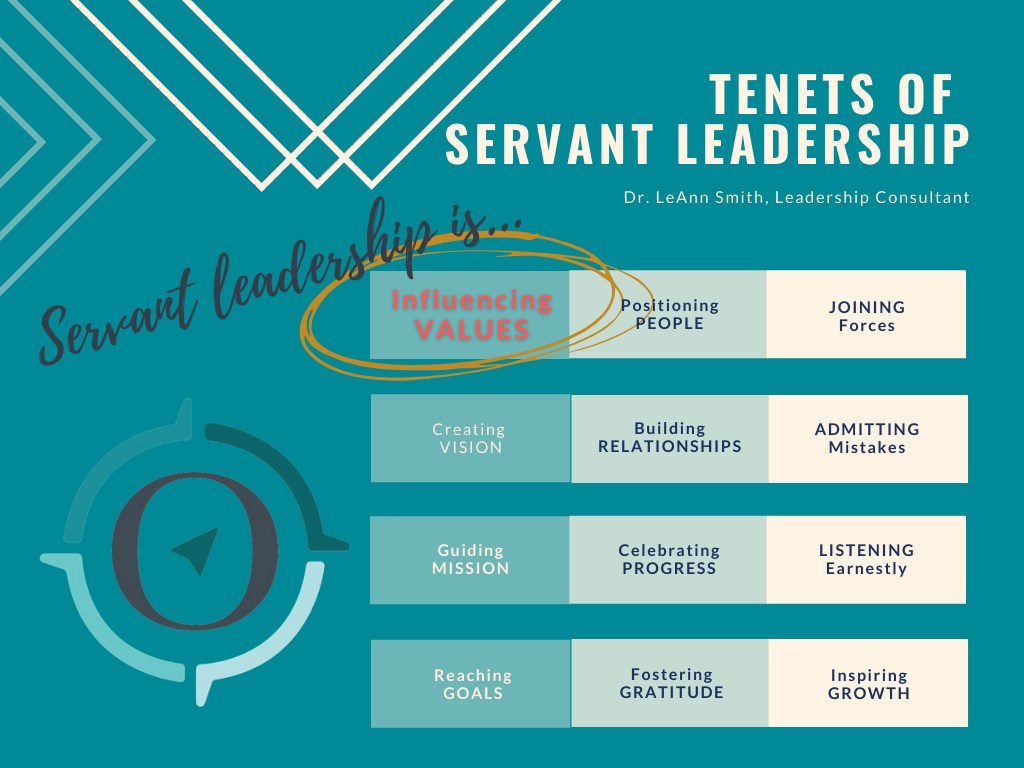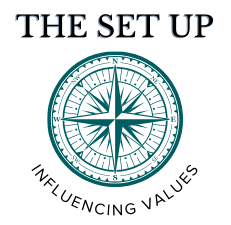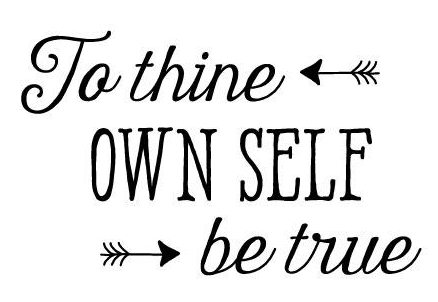If you have recognized there is strength in the struggle, you are well on your way to becoming a servant leader. In defining servant leadership, we identified 12 tenets of servant leadership to inspire leaders.
Let’s delve into the first tenant of servant leadership: influencing values.

The concept of influencing values fits neatly into the following segments:
- The Set-Up – How identifying your own values and substantiating the need for organizational values increases your positive influence.
- The Daily Grind – How you can increase your positive influence by applying values to your daily activities and interactions.
- The Lifeboat – How challenges create opportunities for you to influence organizational values during difficult times.
- The Long Haul – How being intentional with values can permeate the organization’s culture and have a lifelong impact on those you lead.

Identify your own values
You can be certain you need to work with your team on setting up clear values. After all, you are the leader, and you need to give your crew some direction!
You are all set to begin this discussion with your staff; then a terrifying thought creeps into your head. You suddenly realize the moment you introduce the idea of exploring values, looks of contempt will be shot at you from every angle. If you want to avoid those looks and the negative feelings associated with them, the set-up is important. Consider providing yourself with adequate preparation and your staff with relevant research and opportunities for reflection.
Writing values and putting them in a neatly printed and bound notebook, to be placed on a shelf to collect dust, is a thing of the past. The values you help your team develop will influence their work – and their family and friends – on a daily basis. You might start with a notebook, but strive to put values into action.
How do you start the values conversation? Whoa…hold that thought. You have a very important step to complete before the conversation with your team can begin. First, you must be prepared.
Get in touch with your own personal values. If you need help clearly identifying your values, don’t despair. Check out the Orbis values as an example. This may take a little time but you must be true to yourself in order to be true to those you lead.

Next, after some soul searching about your own values, consider how your values translate to the workplace. You are certain to find parallels that already exist.
In terms of research, explore successful companies in your field. Most likely, those very successful companies built their success on a foundation made of values. After all, the wise man built his house upon the rock and the house on the rock stood firm.
Identify trends of successful companies
Ok, so now you are finally ready to start the conversation. Please, for the love of all people who have been through multiple values training, do not, I repeat, do not schedule a meeting to write organizational values. Instead, schedule a meeting to identify value trends of successful companies. Then have media available for team members to read, listen to, view and discuss. Have them tease out values that speak to them on a personal and professional level. Take notes, and stop while you have them interested. Encourage team members to explore their own personal values before your next meeting.
When you meet again, begin with a round table discussion of team members’ individual reflections on how their personal values impact their daily work. Ask them what they notice about the connections between their personal values and the values of highly successful companies. Delve into why and how the values of those companies compare to the values of your company. This is where you start documenting the team’s thoughts on your organization’s values. You may quite possibly be able to model your values after other successful companies values with some originality thrown in from your team’s collective values. As you settle on your values, make sure they are accessible to the entire team. Please avoid putting them in that vault of a binder we discussed before. Make your values visible. Your organizational values need to be part of your daily routine.

Apply values to daily life
In the values discussion, you talked the talk. Now, dear leader, you must walk the walk. Apply the values your group identified in your interactions with customers, board members, employees, and anyone with whom you interact. Encourage and motivate the people you lead to do the same. You are responsible for making your organizational values visible. Posters are great for reference and highly encouraged. Even so, leading by example is where your influence will be the greatest. Additionally, when you see other leaders and followers putting your organization’s values into action, CELEBRATE that success! Incorporate your core values into as many aspects of your daily life as possible including daily interactions, formal communication, and even evaluations.

Embrace challenges
When you hit rough waters, being true to your organizational values can save your company and your relationships. When problems occur, values keep you true to coarse and away from negativity. Instead of laying blame or justifying mistakes, teams who hold fast to core values take responsibility for their actions and see struggles as an opportunity for learning. Storms will still come your way, but your organization will be better equipped to deal with adversity. As you develop a more value-conscientious crew, they begin to own their professional problems, and they can admit when they are wrong.
Certainly, if your organization embraces innovation, growth, or a myriad of other progress-centric core values, there might be a few mistakes on your path to success. Often, ugly mistakes lead to beautiful progress. When teams endure the hardships together, they enjoy the times of smooth sailing even more. Values serve as the lifeboat that helps teams reunite safely on the other side of the challenges.

Be intentional
Through embracing the tenant of influencing values, your positive impact as a servant leader can permeate culture for the long haul. As a leader toiling to develop organizational values, your time investment is substantial. Fortunately, the benefits of helping others develop a deeper understanding of who they are and what they stand for is also monumental. Likewise, your organization will benefit from having a rock solid foundation built on meaningful and enduring values. Those values are so important that they just might help save organizations and team members in difficult times.
Servant leaders, please remember that the leaders and followers you are affecting will reap benefits of your positive influence in the workplace and in their lives outside of the organization. The work that you undertake when influencing values can be grueling, but your efforts will make an impact on your company and its valued team members now and for the long haul.

